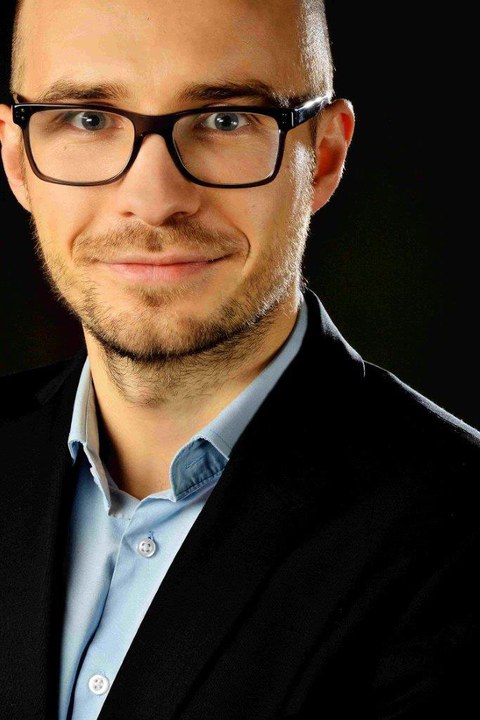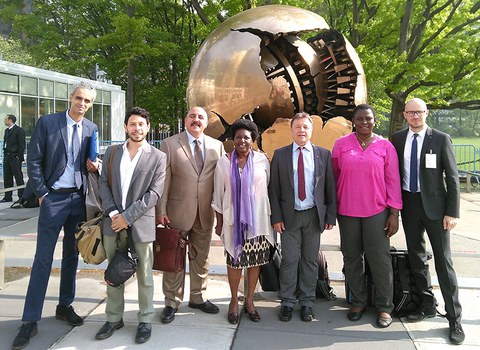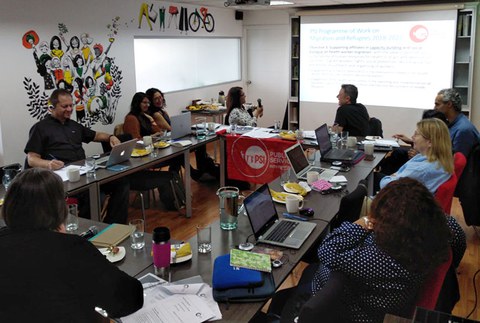A “man of many hats” who is close to the political action
(Profile from 2022)
Dagmar Möbius
Felix Braunsdorf completed an apprenticeship as a carpenter before beginning his Bachelor’s degree in Political Science with a minor in Media and Communication at TU Dresden in 2007. He now works as a migration and development advisor in the Global and European Policy Department at the Friedrich-Ebert-Stiftung foundation in Berlin.

Felix Braunsdorf is a migration and development advisor
Braunsdorf is from Kassel in former West Germany, but there was no culture shock when he decided to study in Dresden. “I’m a child of the reunification era,” he says. “Going east was not a problem for me. It was no different than if I had moved to Bavaria or the Ruhr valley. I had friends who were studying in Dresden and gave me a good impression of the place.” The various institutes also had a strong reputation. “There were no tuition fees and the city was really charming.” He was impressed by the combination of politics and communication. “The relationship between politics, media, and a country’s citizens plays an important role in the quality of democracy. In this age of disinformation and fake news, this link is more apparent than ever.”
His decision to major in Political Science at TU Dresden, with a minor in Media and Communication and a specialization in International Relations and Political Systems, turned out to be the right one. “The grounding in German politics and international relations definitely help me in my current job.” His work as a tutor and student assistant at the Center for International Studies has also hugely benefited him. “Those roles gave me practical work experience and an insight into research projects that you simply don’t get as an ordinary student. The ability to get to grips with new concepts and fields quickly is also something I learned at university.” Braunsdorf is still in touch with many fellow students and lecturers today. He talks of his lecturer Sabine Friedel and “great seminars” with Dr. Sebastian Lange, who became a good friend.

Participants from the FES delegation at the negotiations surrounding the Global Migration Compact at the United Nations' headquarters in New York, September 2018.
For his Master’s, Felix Braunsdorf moved to the University of Potsdam, where he studied administration. He specialized in governance and government, international organizations, and global crisis management. Braunsdorf worked during his degree as a student assistant in the global governance unit at the Berlin Social Science Center (WZB). After graduation, he interned at the German Foreign Office and the Deutsche Gesellschaft für internationale Zusammenarbeit (GIZ) before joining the Friedrich-Ebert-Stiftung foundation in Berlin. Since 2016, Felix Braunsdorf has been a migration and development advisor in the foundation’s Global and European Policy Department, where two other TUD alumni also work. His work focuses on the root causes of refugee movement, development-centered and rights-based migration policies, and the implementation of the United Nations Global Compact for Safe, Orderly and Regular Migration.
He has been engaging with the international causes of displacement for many years. “Unfortunately, the issue is still approached too reactively,” he says. “We wait so long that the causes become acute. This is true for climate-related migration as well as for violent conflicts.” His projects center on consultancy, bringing new perspectives into the political debate, connecting stakeholders, organizing events and producing publications. Together with other colleagues, he manages the online Displacement, Migration, Integration portal, where experts and partner organizations of FES have their say. “Subjects include the global distribution of refugees, and how European coordination can succeed,” he explains. Felix Braunsdorf is currently working on a civil society shadow report on the implementation of the Global Compact for Migration. In May 2022, the Compact for Migration will be in the spotlight at the 1st International Migration Review Forum (IMRF) at the UN in New York. “The IMRF is to the area of migration what COP is to the climate issue.” Braunsdorf is a project manager, editor, author, coordinator, and consultant for partner organizations, and must be in a position to speak to the media. “I’m a man of many hats,” he says. “The job is anything but dry.”

Delegation of the Public Services International (PSI) trade union at the Global Forum on Migration and Development in Quito, January 2020.
He and his colleagues are closely monitoring the current situation in Ukraine. “We are looking at the situation in neighboring countries, what the implications are for the Common European Asylum System, and also at geopolitical and humanitarian aspects such as rising food prices and the hunger this is causing. “The resources of aid organizations were already stretched before the war in Europe, for there are many humanitarian crises around the world.”
How does he deal with it? “I embrace positive news and a culture of welcoming. Our partner organizations act out of a deep sense of conviction and immense humanity. It is people’s lives, their future prospects and rights that are at stake. That drives me and gives me purpose.”
Contact:
Felix Braunsdorf
Migration and Development
Friedrich-Ebert-Stiftung
Global and European Policy (GEP)
Hiroshimastraße 28
10785 Berlin
Tel.: +49 30-26-935-7462
